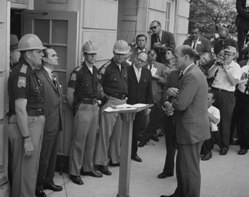 Today the 111th Congress convenes and the lingering question is whether Senate Majority Leader Harry Reid will make good on his threat to block Roland W. Burris from being sworn-in as the replacement for Barack Obama representing the state of Illinois. Burris, the former state Comptroller and Attorney General, and the first Black elected statewide in Illinois, was picked by Governor Rod Blagojevich to finish the final two years of Mr. Obama’s term of office. The surprise move by Blagojevich, coming as Democrats have called for the governor’s removal from office over his alleged involvement in a pay-to-play scheme, prompted Senate Democrats to cast the pick as “tainted” and Reid to declare that Burris would not be allowed to take his seat in the Democratic Caucus.
Today the 111th Congress convenes and the lingering question is whether Senate Majority Leader Harry Reid will make good on his threat to block Roland W. Burris from being sworn-in as the replacement for Barack Obama representing the state of Illinois. Burris, the former state Comptroller and Attorney General, and the first Black elected statewide in Illinois, was picked by Governor Rod Blagojevich to finish the final two years of Mr. Obama’s term of office. The surprise move by Blagojevich, coming as Democrats have called for the governor’s removal from office over his alleged involvement in a pay-to-play scheme, prompted Senate Democrats to cast the pick as “tainted” and Reid to declare that Burris would not be allowed to take his seat in the Democratic Caucus.
While most Democrats agree that Governor Blagojevich is “damaged goods” due to the criminal charges that have been leveled against him by U.S. Attorney Patrick Fitzgerald, his choice of Roland Burris complicates matters significantly. Senator Reid walks a thin line in trying to be seen as a champion of ethics in taking on Blagojevich and not be viewed as denying an opportunity to a qualified Black American to serve in the upper house of Congress that currently has no Black members. Already, members of the Congressional Black Caucus have publicly expressed their support for Roland Burris and the former Illinois official is receiving public support in his home state, particularly in Chicago, a Democratic stronghold.
Reid’s maneuver may not have any real long-term political consequences but it could be a short term public relations nightmare on the eve of the inauguration of the nation’s first Black President. The imagery of Burris being physically denied entrance to the Senate chamber will undoubtedly evoke memories of Alabama Governor George Wallace standing in a doorway at the University of Alabama in 1963 blocking federal marshals who were trying to escort Black students who were attempting to register for classes. Such a confrontation could not come at a worse time for Democrats who are still basking in the glow of Barack Obama’s victory and cannot afford to be seen as offending Black voters, who came at in droves for Obama and Democratic candidates across the country. The attempt to split hairs – denouncing Blagojevich while acknowledging Burris’ fitness to serve – may backfire on Reid and his Democratic colleagues if Burris does indeed show up at the Capitol and demands to be seated.
By any account Senator Reid is in a no-win situation. If Roland Burris arrives today and is not allowed to be sworn-in, Reid will be roundly denounced by Black leadership in Congress and throughout the country. By seating Burris the Senate Majority Leader will be criticized for backing down and supporting the pick of a governor he has denounced. What is clear is that Governor Blagojevich outmaneuvered his fellow Democrats with the choice of Roland Burris. By drawing a line in the sand Democratic leaders boxed themselves into a corner. Most thought the spectacle of Governor Blagojevich’s arrest and the circus like atmosphere that followed would force the governor to resign. It did not, and made him more determined to stay in power while efforts to remove him from office have moved slowly. No matter how he is characterized by Democrats or the media, Rod Blagojevich is still the governor of Illinois and he exercised his right and authority to fill a vacancy in the United States Senate. There is no getting around the latter fact.
In many ways the drama around Blagojevich has once again highlighted issues of race in our nation’s leadership. Long before the scandal in Illinois broke, Black leaders were calling for Mr. Obama’s replacement to be a Black American. The resignation of the President-elect from the Senate left the body with no Black membership and once again demonstrated that despite Mr. Obama’s historic victory and all the rhetoric about a post-racial America in the aftermath of the presidential election, there are still significant hurdles to overcome. The thought that the United States Senate will convene in 2009 without a single Black member is a reflection of the nation’s unfinished business in the area of racial progress.

today in black history
March 04, 2026
J. Ernest Wilkins is named Undersecretary of Labor by President Dwight D. Eisenhower on this date in 1954.
Reid channels Wallace in Blocking Burris
Democrats run risk of reviving Dixiecrat era image
POSTED: January 06, 2009, 12:00 am



















